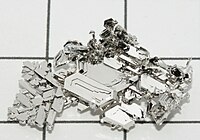
In Vivo Anticancer Activity of a Nontoxic Inert Phenolato Titanium Complex: High Efficacy on Solid Tumors Alone and Combined with Platinum Drugs
Sign Up to like & getrecommendations! Published in 2018 at "Chemmedchem"
DOI: 10.1002/cmdc.201800551
Abstract: Due to the toxicity of platinum compounds used in the clinic as anticancer chemotherapies, titanium serves as a safe and attractive alternative. Lately, we introduced a new family of Ti complexes based on readily available… read more here.
Keywords: vivo anticancer; platinum; anticancer activity; efficacy ... See more keywords

Designing Synthetic, Sulfated Glycosaminoglycan Mimetics That Are Orally Bioavailable and Exhibiting In Vivo Anticancer Activity
Sign Up to like & getrecommendations! Published in 2023 at "Journal of Medicinal Chemistry"
DOI: 10.1021/acs.jmedchem.2c01511
Abstract: Sulfated glycosaminoglycans (GAGs), or synthetic mimetics thereof, are not favorably viewed as orally bioavailable drugs owing to their high number of anionic sulfate groups. Devising an approach for oral delivery of such highly sulfated molecules… read more here.
Keywords: vivo anticancer; synthetic sulfated; orally bioavailable; sulfated gag ... See more keywords

In Vivo Anticancer Activity of a Rhenium(I) Tricarbonyl Complex.
Sign Up to like & getrecommendations! Published in 2019 at "ACS medicinal chemistry letters"
DOI: 10.1021/acsmedchemlett.9b00128
Abstract: The rhenium(I) complex fac-[Re(CO)3(2,9-dimethyl-1,10-phenanthroline)(OH2)]+ (1) was previously shown to exhibit potent in vitro anticancer activity in a manner distinct from conventional platinum-based drugs (J. Am. Chem. Soc. 2017, 139, 14302-14314). In this study, we report… read more here.
Keywords: vivo anticancer; microscopy; rhenium; activity ... See more keywords

In Vivo Anticancer Activity of AZD3965: A Systematic Review
Sign Up to like & getrecommendations! Published in 2021 at "Molecules"
DOI: 10.3390/molecules27010181
Abstract: Proliferating cancer cells have high energy demands, which is mainly obtained through glycolysis. The transmembrane trafficking of lactate, a major metabolite produced by glycolytic cancer cells, relies on monocarboxylate transporters (MCTs). MCT1 optimally imports lactate,… read more here.
Keywords: cancer; vivo anticancer; anticancer activity; systematic review ... See more keywords